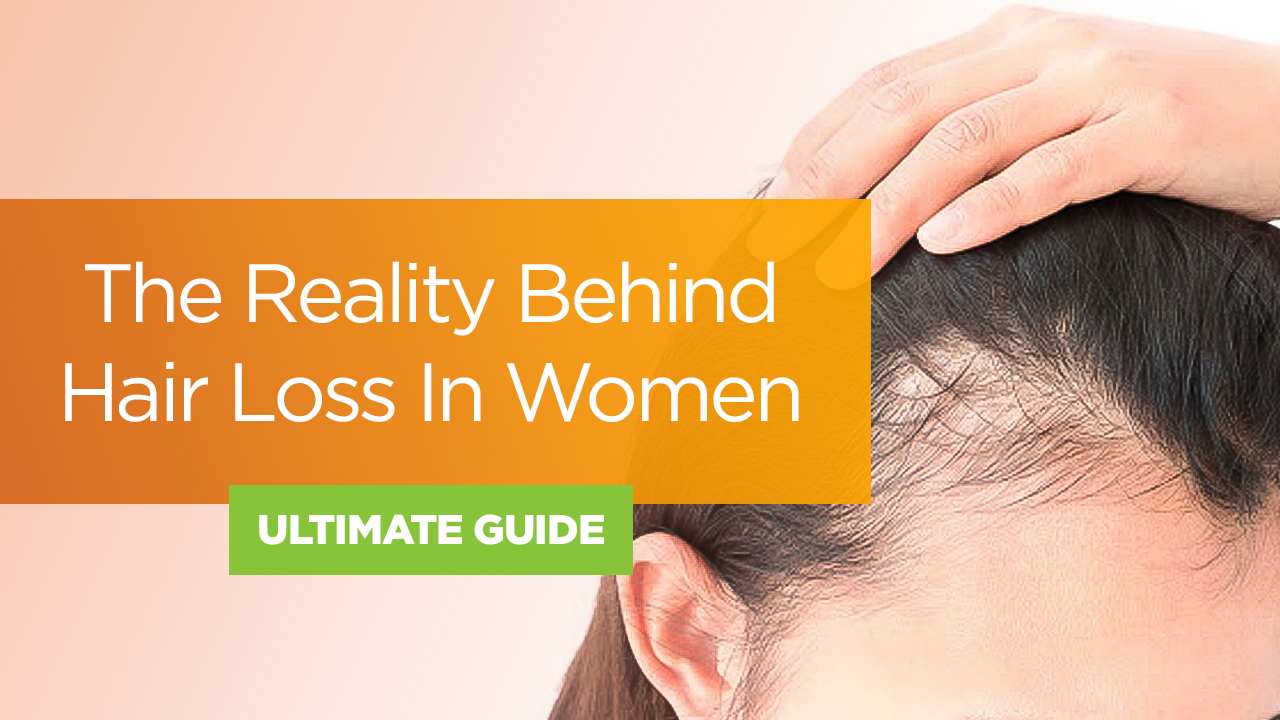Hair loss is commonly attributed to men, but did you know that it affects more than 50% of women?
In fact, Cleveland Clinic found that female-pattern hair loss affects almost 30 million women in the United States. So before you read on, just know that you are not alone.
While it is typical for the average woman to lose an average of 50-100 hairs a day, anything more than that can be an indicator that is underlying issues.
This could be anything from over-styling, to nutrient deficiencies, to even alopecia.
While changing your hairstyle, adding extensions, and even wearing hats may help mask hair loss in the short term, it’s important to seek care as soon as possible to ensure the healthy restoration of your hair. Temporary solutions are just that, temporary.
Finding holistic and natural remedies will help you in the long-term for sustainable hair growth and health.
Nutrition: Vitamins, Minerals & More
Nutritional deficiencies can affect your hair growth and increase hair loss.
It is important for your diet to have adequate amounts of protein, iron, zinc, as well as vitamins A, C, D and B. One could also supplement with hair growth vitamins.
Here is a breakdown of each vitamin and mineral:
Vitamin A
Vitamin A stimulates cell growth in your body.
It helps produce sebum (a natural oil) that moisturizes your scalp and keeps your hair healthy. You can find naturally occurring Vitamin A in milk, eggs, kale, pumpkins, and carrots.
While too much sebum has been linked to hair loss, too little sebum can lead to the same thing.
Supplements Shown To Reverse Hair Loss In Women
Vitamin C
Vitamin C has many benefits for your hair health.
It helps your body absorb iron, fight free radical damage, and helps slow the aging process. You can find vitamin C in citrus fruits, broccoli, green and red peppers, and spinach.
Vitamin D
Vitamin D helps fight cell damage to improve your hair growth. Free radical damage can greatly affect your hair health, so getting the proper amount of vitamin D in your diet is essential.
Some sources of vitamin D are fatty fish, fortified foods, and of course the sunshine. Vitamin D deficiencies are common, so it’s important to make sure you are getting adequate amounts.
B Vitamins
B vitamins are essential for energy metabolism and healthy blood cells. The most well known B vitamin for hair growth and health is called biotin, sometimes referred to as vitamin H.
Most hair growth supplements contain this vitamin based on its ability to improve keratin in your body. Various B vitamins can be found in seafood, whole grains, almonds, and leafy greens.
Zinc
Zinc helps repair your hair tissue, stimulates growth, and is found in beef, pumpkin seeds, beans, and fortified products.
It is important to ensure you are getting the proper dose of Zinc, as too much can have negative effects on your hair. You should never consume more than 40 mg of zinc per day.
Iron
Iron deficiencies can be detrimental to hair growth. A common sign of iron deficiency is anemia. Anemia is very common in women due to menstration and childbirth, and can causes hair loss among other health issues.
The best sources for iron are red meat, eggs, spinach, and lentils.
Protein
Protein is the building block for hair growth, in fact, did you know that hair is made up mostly from protein? You can find protein in many sources such as meat, seafood, beans, lentils, and even spinach.
So What’s Next?
Now you know the basic vitamins and minerals you need to stimulate hair growth and health.
However, this list is not extensive.
Along with these nutrients, several other vitamins and minerals work together to stimulate follicle growth like L-Cysteine, Grape Seed Extract, Horsetail Rush Herb, and more.
Getting the right amount of nutrition has never been harder
Getting the proper amount of vitamins and minerals from food can be challenging at times, so there are plenty of supplements available to support any deficiencies.
One popular option is to buy your vitamins separately, or purchase hair growth specific vitamins (specifically tailored custom blends).
Below are some of our favorites:
- Sugar Bear Hair Gummies
- Biotin Eu Natural
Proper Hair Care
Do you bleach, color, or frequently style your hair?
Harsh chemicals and heat tools can harm hair growth and even encourage hair loss. If you are experiencing hair loss or want to improve the health of your hair, here are some ways to properly care for your hair.
Take it Easy on the Heat Styling
If you blowdry, flat iron, or regularly curl your hair you could be creating irreparable damage. There are several ways to style your hair without heat. Using a quality and sulfate-free leave-in conditioner can prevent flyaways and improve shine.
Instead of a curling iron, soft curlers are an alternative way to add volume and bounce (without the damage). If you do need to blow dry your hair, consider using a heat protection spray or balm to protect your hair from damage. It is always good to air dry if possible and just let your hair be in its natural state.
The fewer products and styling tools you use, the better!
Coloring and Bleaching
Do you frequently color or bleach your hair?
This might be why you are experiencing hair loss or thinning. The chemicals in hair dye and bleach weaken your hair, making it more susceptible to breakage.
Overly processing your hair can cause it to fall out. While some henna colors are gentle on your hair, bleaching is the most damaging thing you can do. Bleach causes your hair to swell and cause porosity. This can cause your hair to absorb moisture but lose it just as fast. Another downside to bleaching is the frequency.
If you are not naturally blonde you will have to touch up your roots every 6-8 weeks. Not only is this costly, but it is also continually damaging your hair in the long-run. Bleaching causes split ends, weakened follicles, and damage.
If you can, embrace your natural color or ask your stylist for less invasive ways to color your hair. This may mean adding subtle highlights or other more gentle colors.
Styling Solution
We have covered how styling can potentially damage your hair. The best way to care for your hair is to avoid coloring and heat styling as much as possible.
Use sulfate-free shampoo’s and conditioners, and don’t feel the need to wash your hair every day. Stripping your hair of its natural oils can dull and damage your hair.
Try every other day if possible to encourage natural oil and hair growth.
Prescription Drugs
Once you meet with your doctor and get the proper blood work done, you might receive a prescription to help fight hair loss. If your doctor finds a hormonal deficiency, they may prescribe medication to help with thyroid and hormonal health.
Some of these include levothyroxine Levoxyl, Synthroid, Tirosint, Unithroid, and Unithroid.
You may also receive a high dose prescription for Iron if you have anemia as well. There are not many hair loss medications available for women as of today.
Finastride is one but it mostly recommends for men due to its testosterone effects. Some doctors might recommend Spironlactone or Flutamide.
However these medications have other uses and side effects, so be sure to discuss this with your health provider.
Another hair loss therapy is anti-androgens.
This medication can be extremely helpful for women battling hair loss from PCOS but again, this medication does have some possible side effects including increased weight gain, fatigue, issues in pregnancy, and depression.
Another prescription worth noting is birth control. Birth control can contribute to hair loss in women.
“Birth control pills cause the hair to move from the growing phase to the resting phase too soon and for too long. This form of hair loss is called telogen effluvium. Large amounts of hair can fall out during this process.”
If you are already susceptible to hair loss, you might consider alternative forms of birth control such as natural cycles and non-hormonal IUDs.
Natural cycles require you to track your menstruation and ovulation cycles so you know when your body can conceive. You can also discuss having a copper IUD implanted by your doctor to prevent pregnancy.
Be sure to discuss alternative options with your health care provider.
Minoxidil (Rogaine)
Another well-known option for hair loss is Rogaine.
Rogaine will only work if your hair loss is a result of female pattern baldness. If you have any other condition resulting in hair loss, this might not be the best option for you.
Minoxidil is also the only FDA approved drug for female pattern baldness as of today. Before using this product you should speak to your health care provider to ensure that you do not have any other medical issues.
If you suffer from PCOS, have a thyroid disorder, or nutritional deficiencies- Rogaine will not work well for you.
Low Level Laser Therapy (LLLT)
Low Level Laser Therapy is another holistic approach to stimulate hair growth.
Studies have found this option to have the least amount of adverse side effects and have found low-level laser therapy to be both safe and effective for men and women.
Some of the benefits to LLLT are:
• Pain-Free
• Hormone-Free
• Full Scalp Coverage
• FDA Cleared
• Hair Re-Growth
Low-level laser therapy works in five different ways to stimulate your hair growth.
First, it inhibits 5-alpha reductase. This enzyme converts testosterone into DHT- a known cause of hair loss. Low-level laser therapy also activates shock proteins that encourage hair follicle stem cell growth.
This therapy also increases oxygen and blood flow to the scalp, increasing nutrients and circulation to the scalp. And low-level laser therapy causes helpful inflammation that stimulates hair growth without negative side effects.
This option is great if you would like a holistic approach to regaining the health of your hair and our recommended LLLT device is the 272 by illumiflow.
Conclusion
As you can see there are many ways to holistically treat your hair loss.
We suggest you start with nutrition, get checked out by your doctor, practice proper hair care, and find the best option for your lifestyle.
While hair loss can be a trying and traumatic experience, you can regain healthy hair again. We hope you found these alternative methods helpful!


